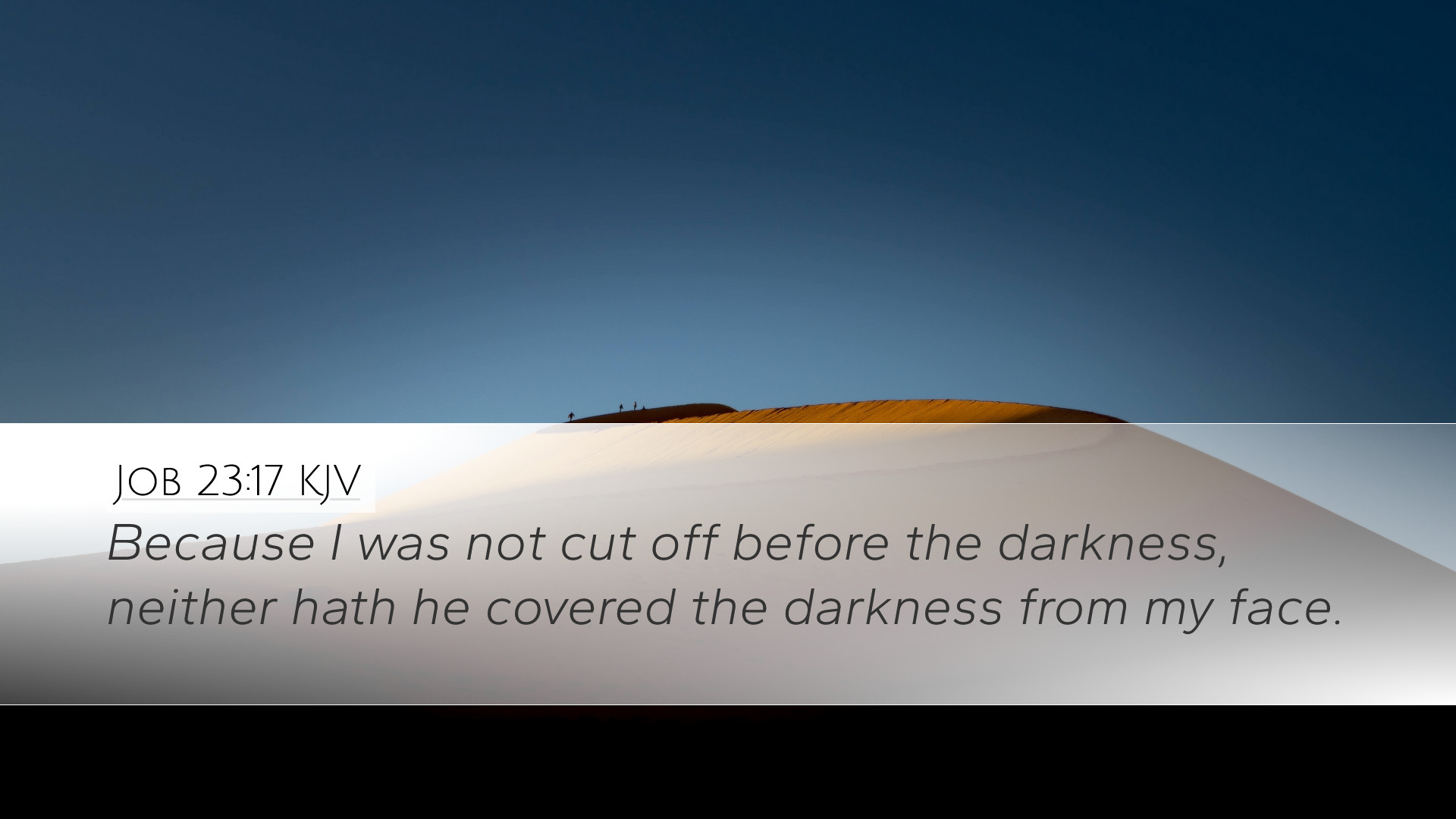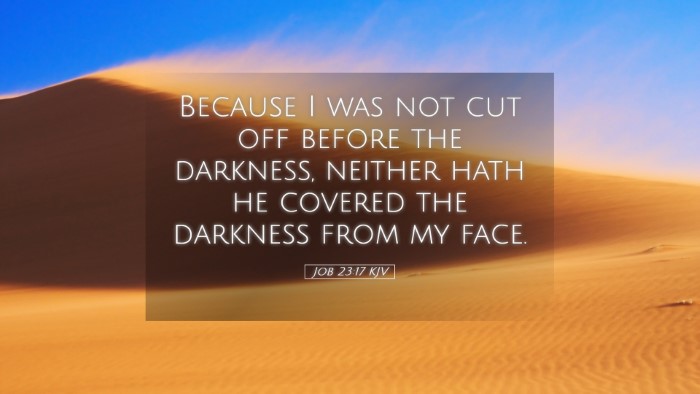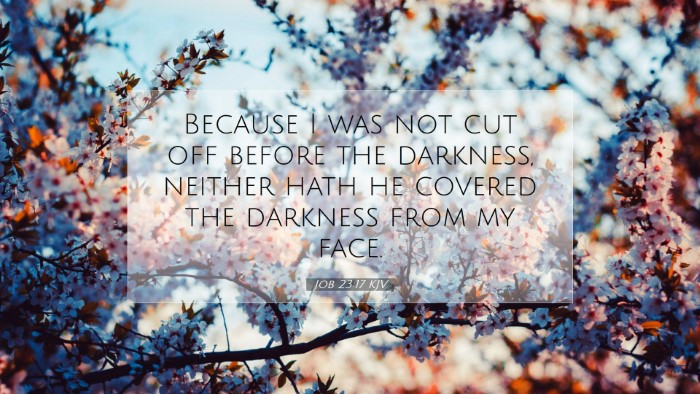Old Testament
Genesis Exodus Leviticus Numbers Deuteronomy Joshua Judges Ruth 1 Samuel 2 Samuel 1 Kings 2 Kings 1 Chronicles 2 Chronicles Ezra Nehemiah Esther Job Psalms Proverbs Ecclesiastes Song of Solomon Isaiah Jeremiah Lamentations Ezekiel Daniel Hosea Joel Amos Obadiah Jonah Micah Nahum Habakkuk Zephaniah Haggai Zechariah MalachiJob 23:17
Job 23:17 KJV
Because I was not cut off before the darkness, neither hath he covered the darkness from my face.
Job 23:17 Bible Commentary
Commentary on Job 23:17
Job 23:17: "Because I was not cut off before the darkness, neither hath he covered the darkness from my face."
Introduction
The verse presents a poignant moment in Job’s dialogue with God, revealing his deep anguish amid suffering. Job laments the apparent distance of God and his struggle with feelings of despair and abandonment. This commentary seeks to provide insights from respected public domain sources to enrich the understanding of this text for pastors, students, theologians, and Bible scholars.
Contextual Overview
Job, a figure of profound suffering, engages in a quest for understanding and justice from God. In this chapter, he expresses his desire to confront God directly. The surrounding verses depict his inner turmoil and the struggle between faith and despair. Job feels overshadowed by darkness, which symbolizes not only physical suffering but also spiritual and existential desolation.
Exegesis and Interpretation
In the context of Job 23:17, several themes emerge:
- The Silence of God: Job struggles with the seeming silence of God in the midst of his trials.
- Despair and Darkness: The metaphor of darkness reflects Job’s emotional and spiritual state.
- The Desire for Encounter: Job yearns for an audience with God to plead his case.
Insights from Daniel Clarke
Adam Clarke highlights the gravity of Job’s predicament. He underscores how Job's mention of not being "cut off before the darkness" illustrates his awareness of mortality. Clarke notes that Job is acutely aware of his life being under threat, yet he clings to life, even in overwhelming suffering.
This craving for divine clarity in the midst of torment reveals the depth of human experience—one that seeks understanding even when faced with death itself.
Insights from Matthew Henry
Matthew Henry, known for his practical yet deep insights, interprets this verse as a testament to Job's endurance. He suggests that the phrase "the darkness" signifies the afflictions and trials that Job faces—his silent suffering before God. Henry emphasizes the importance of Job's faith, indicating that despite feeling overshadowed, Job refuses to abandon his belief that God is just and will ultimately provide answers.
This resilience serves as an inspiration, encouraging believers to hold onto their faith during periods of distress and doubt.
Insights from Albert Barnes
Albert Barnes focuses on the existential implications of Job's lament. He observes that Job feels "covered by darkness," a metaphor for the reality that sometimes God's presence seems absent in our trials. Barnes interprets Job's struggle as a universal experience of believers who, grappling with pain, may struggle to perceive God's presence or purpose. He notes that Job's honesty in articulating his feelings lays the groundwork for authentic faith.
Barnes highlights that Job's desire for clarity from God amidst confusion is a significant element in the healing process of suffering believers.
Theological Reflections
This verse invites significant theological reflection. The concepts of divine silence, human suffering, and the quest for meaning during trials are central themes in Christian thought. The darkness Job experiences resonates with the Christian understanding of the 'dark night of the soul'—a period when one feels abandoned yet is invited into deeper faith.
Furthermore, the desire for an audience with God underscores humanity's inherent instinct to seek reconciliation and clarity in the face of suffering.
Practical Applications
- Encouragement in Suffering: This passage serves as a reminder that distress can lead to a richer faith when one perseveres through trials.
- Embracing Vulnerability: Pastors and teachers can draw on Job's transparency to encourage congregants to share their struggles without fear.
- Faith amidst Doubt: The text challenges believers to continue seeking God during their darkest moments, exemplifying a faith that wrestles with difficult questions.
Conclusion
Job 23:17 encapsulates a profound human experience—the intersection of suffering, the silence of God, and the quest for understanding. Through the insights gained from public domain commentaries by Adam Clarke, Matthew Henry, and Albert Barnes, readers can appreciate the depth of Job's lamentation as it reflects not only a personal journey but a broader theological narrative. This commentary encourages ongoing dialogue of faith and doubt, emphasizing that even amid darkness, the quest for God remains a vital spiritual endeavor.


